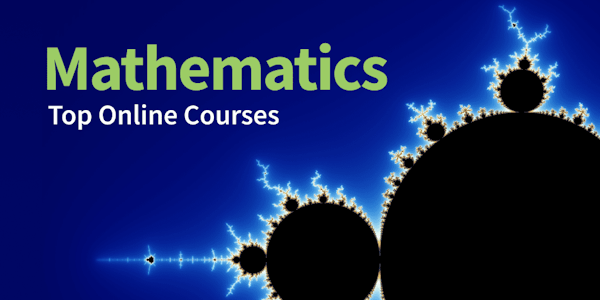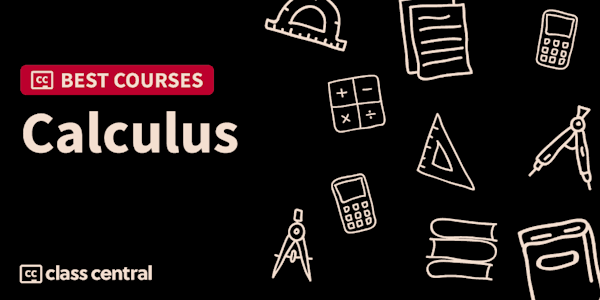What you'll learn:
- How to solve problems in chosen Precalculus topics (illustrated with 236 solved problems) and why these methods work.
- Repetition of chosen aspects of high school mathematics (basic notions as numbers, functions, sets, equations, and inequalities).
- The basic notions will be defined in a more abstract way, and you will get an insight into their place in Calculus and some other branches of university maths.
- By the end of this course you will be able to understand all the elements in the epsilon-delta definition of limit, both symbols and the content.
- Arithmetic with basic rules (associativity and commutativity of addition and multiplication, distributivity) illustrated for positive integers.
- Basic terminology for equations and inequalities, with examples of linear equations and inequalities, with and without absolute value.
- Basic concepts related to functions (domain, range, graph, surjection, injection, bijection, inverse, composition) and how to work with them.
- Functions: monotone (increasing, decreasing), bounded, even, odd; extremum: maximum, minimum, both local and global.
- Geometrical operations on graphs of functions: translations, reflections, shrinking, dilating. Piecewise functions.
- Absolute value and its role in computing distances, with geometrical illustrations and functional approach.
- Equations of straight lines in the plane: slope and intercept; first glimpse into derivative as the slope of the tangent line, and link to monotonicity.
- Introduction to sequences and series; short notation for sum (Sigma) and product (Pi); arithmetic, geometric, and harmonic progressions.
- Logic: symbols and rules (tautologies) used for creating mathematical statements, definitions, and proofs.
- Set theory: union, intersection, complement, set difference; some important rules and notation.
- Relations: RST (equivalence) relations, order relations, functions as relations.
- Necessary and sufficient conditions: definition and examples.
- Various types of proofs: direct, indirect, by contradiction, induction proof, with some examples.
- Building blocks of mathematical theories: axioms, definitions, theorems, propositions, lemmas, corollaries, etc.
- Decimal expansion of rational and irrational numbers. Density of Q and R\Q in R.
- Cardinality of sets: finite sets, N, Z, Q, R; countable and uncountable sets.
- You will also get a solid background for any future studies in Real Analysis and other courses in university mathematics.
Precalculus 1: Basic notions
Mathematics from high school to university
S1. Introduction to the course
You will learn: about this course: its content and the optimal way of studying.
S2. Magical letters and symbols
You will learn: Greek and Latin letters and their usage in mathematics; mathematical symbols you will learn during this course.
S3. Numbers and arithmetic
You will learn: about different kinds of numbers (natural numbers, integers, rational numbers, irrational numbers, real numbers) and their arithmetic.
S4. Absolute value and distances
You will learn: Cartesian coordinate system: the axes, the unit, the origin, the coordinates of points, coordinates after reflections about the axes and the origin; absolute value as the distance from a real number to zero; absolute value for measuring distances; distances in abstract metric spaces.
S5. Equations and inequalities
You will learn: different ways of looking at equations and inequalities (as something to be solved, or as something what describes certain sets), with focus on linear equations and inequalities containing absolute value. Solution sets as subsets of R or R^2.
S6. Functions
You will learn: about functions: various ways of defining functions; domain, range, graph; x- and y-intercepts; surjections, injections, bijections, inverse functions; increasing and decreasing (monotone) functions; bounded functions; arithmetic operations on functions; compositions of functions; odd and even functions; transformations of graphs.
S7. Logic
You will learn: the meaning of the symbols used in logic; conjunction, disjunction, implication, equivalence, negation; basic rules of logic (tautologies) and how to prove them; two kinds of quantifiers: existential and universal; necessary and sufficient conditions.
S8. Sets
You will learn: the basic terms and formulas from the Set Theory and the link to Logic; union, intersection, set difference, subset, complement; cardinality of a set; Inclusion-exclusion principle.
S9. Relations
You will learn: about binary relations generally, and specifically about RST (Reflexive-Symmetric-Transitive) relations, equivalence classes, and about order (partial order) relations.
S10. Functions as relations
You will learn: definition of a function as relation between sets: domain and co-domain; injections, surjections, bijections, inverse functions.
S11. Axioms, definitions, theorems, and proofs
You will learn: the meaning of words axiom, definition, theorem, lemma, proposition, corollary, proof; Various types of proofs with some examples: direct proof, proof by induction, indirect proof, proof by contradiction.
S12. Sequences and series; AP, GP, HP
You will learn: how to use the symbols Sigma and Pi; you will also get an introduction to sequences and series, with some examples; arithmetic, geometric, and harmonic progressions.
S13. Extras
You will learn: about all the courses we offer. You will also get a glimpse into our plans for future courses, with approximate (very hypothetical!) release dates.
Make sure that you check with your professor what parts of the course you will need for your final exam. Such things vary from country to country, from university to university, and they can even vary from year to year at the same university.
A detailed description of the content of the course, with all the 237 videos and their titles, and with the texts of all the 236 problems solved during this course, is presented in the resource file
“001 List_of_all_Videos_and_Problems_Precalculus_1.pdf”
under video 1 ("Introduction to the course"). This content is also presented in video 1.




